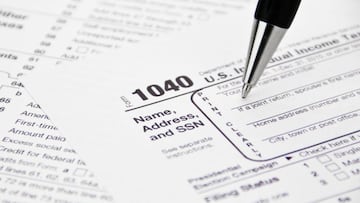Can you receive a stimulus check if you don't file taxes?
8 million people who don’t normally file taxes, this year will most likely have to file in order to get their money from the stimulus checks.

You may need to file a tax return in 2021 regardless if you would otherwise need to, in order to claim missing stimulus money, if you fall into one of the following categories: you don't usually file taxes because you’re part of the SSI or SSDI programs, you're retired or you don't meet the IRS' income threshold. However you don’t want to miss the filing deadline which is 15 April once again this year.
When the CARES Act was passed in the spring of 2020 the IRS and Treasury Department were tasked with sending out the payments to eligible Americans. In order to do that the IRS used the information they had on hand, individuals’ and households’ tax return filings from either 2018 0r 2019. This left out around 8 million non-filers who will now most likely need to file an income-tax filing for 2020 to receive their Economic Impact Payments (EIP), or better known as stimulus checks.
How can I get my stimulus check if I didn’t receive one?
The IRS set up an online form that non-filers could use to provide the necessary details to the IRS for sending their stimulus payments. This also allowed those who receive benefits from SSI or SSDI programs to alert the IRS to their dependents and claim the stimulus money for them. This tool is no longer available to use but by filing a 2020 tax return in 2021 these individuals can use the Rebate Recovery Credit to get the stimulus money due to them.
Who are non-filers?
The IRS refers to people who didn't have to file taxes in 2018 or 2019 as non-filers. This group includes:
- People who are part of the SSI or SSDI programs
- Single people under age 65 with an income of less than $12,200
- Married people under age 65 with an income of less than $24,400
- Single people age 65 or older with an income of less than $13,850
- Married people age 65 or older with an income of less than $27,000
- Veterans and Railroad Retirement beneficiaries
While young adults age 17-24 who are claimed as dependents on someone else's taxes don't have to file taxes, they aren't eligible for a first or second stimulus check due to the rules set out in the CARES Act and the covid-19 relief bill in December. Eligibility for the possible third round is still being worked out in Congress with the House expected to vote on its version at the end of next week.
Typically during tax season, if you're included in any of the above groups, you don't have to file a federal tax return. However, if you received any ACA health care tax credits or subsidies, you'll need to file to keep receiving them. You can also still file to get back any taxes withheld from your pay, or to claim certain refundable tax credits.
- How to file taxes with IRS
- Federal tax filing 2021: IRS and Free File website link
- Tax Filing 2021: How to file an amended Tax Return
- Tax returns will decide your stimulus check entitlement
- Tax filing 2021: how can I track my tax return?
- Taxes 2021: when to expect rebate to arrive
Filing will help ensure that you get the third stimulus check
By filing a return this year the IRS will have your information on file going forward. Congress is set to pass legislation based on the Biden Administration’s $1.9 trillion American Rescue Plan which includes $1,400 stimulus checks in a third round of EIP. There are also proposals for an expanded Child Tax Credit and Earn Income Tax Credit. The enhanced child tax credit could see households receiving up to $300 or $250 per child per month, depending on their age, for six months starting in July.
The IRS will send out these payments automatically based on the information that the agency has without further action on your part. But the deadline to file your tax return is 15 April, 2021.
Income requirements for most people
For most taxpayers, a tax return must be filed if your income exceeded the following minimum income limits last year:
|
Filing status
|
Age at end of 2020
|
Minimum gross income
|
|
Single
|
Under 65
|
$12,400
|
|
Single
|
65 or over
|
$14,050
|
|
Married joint filer
|
Both spouses under 65
|
$24,800
|
|
Married joint filer
|
One spouse under 65
|
$26,100
|
|
Married joint filer
|
Both spouses over 65
|
$27,400
|
|
Married separate filer
|
Any
|
$5
|
|
Head of household
|
Under 65
|
$18,650
|
|
Head of household
|
65 or over
|
$20,300
|
|
Qualifying widow(er)
|
Under 65
|
$24,800
|
|
Qualifying widow(er)
|
65 or over
|
$26,100
|
IRS information sheet with further details
Income requirements for dependents
Related stories
If you are claimed as a dependent on someone else's tax return, a different set of income requirements apply to you. Dependents whose earnings are over the following minimums must file a 2020 return:
|
|
Single
|
Married
| ||||
|
Age at end of 2020:
|
Under 65
|
65 or over
|
65 or over and blind
|
Under 65
|
65 or over
|
65 or over and blind
|
|
Unearned income above:
|
$1,100
|
$2,750
|
$4,400
|
$1,100
|
$2,400
|
$3,700
|
|
Earned income above:
|
$12,400
|
$14,050
|
$15,700
|
$12,400
|
$13,700
|
$15,000
|
|
Gross income above larger of:
|
$1,100 or earned income (max. $12,050) + $350
|
$2,750 or earned income (max. $12,050) + $2,000
|
$4,400 or earned income (max. $12,050) + $3,650
|
$1,100 or earned income (max. $12,050) + $350
|
$2,400 or earned income (max. $12,050) + $1,650
|
$3,700 or earned income (max. $12,050) + $2,950
|
*Married dependents must file a tax return if their income was at least $5 and their spouse files a separate return and itemizes deductions.
Source: IRS
Further IRS information on filing if you're a dependent (including definitions of earned, unearned and gross income)


